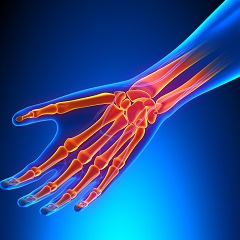Living with arthritis means learning how to manage the symptoms and maximize mobility and, for some types of arthritis, slowing down the progression of the disease with medication.
First, visit your doctor, if you haven’t already. Pain relievers and anti-inflammatory medications can make it easier for you to move around, and can relieve joint stiffness. It’s important not to get discouraged if medications don’t seem to be working right away since some medications can take several weeks to reach their full effect. What helps one person may not help another; you may need to try different medications at various dosages before you find adequate relief.
Adapting life for arthritis
It’s understandable to feel frustrated or down when you can’t do things you once could – whether it’s taking long hikes in the woods or doing fine needlework. But to stay healthy in body, mind and spirit, we need to adapt (possibly easier said then done). Take shorter routes, if you used to enjoy long walks, or take part in a “mall walk” sponsored by your local shopping centre. If it’s getting too difficult to do your favorite hobby, maybe you can learn a similar one that puts less stress on your joints, or use adaptive aids to help you continue doing the one you love. Adaptive aids for arthritis have been around for a while now, and can be found on a number of different websites including http://www.arthritissupplies.com/. You can find products that help you with daily living around the house, hygiene, and mobility aids.

Occupational therapists are a great resource for handy devices that may make it easier for you to continue enjoying your activities. Retire-At-Home Services has built relationships with local professionals like occupational therapists and physiotherapists, so don’t hesitate to give us a call if you would like us to make an introduction.
Exercise and arthritis
Exercise is important! It helps arthritis by improving joint movement and strengthening the muscles that surround the joints. Swimming and walking are great low impact options when done in moderation. This will keep your muscles active without increasing inflammation or joint pain. Swimming is particularly good since the water helps support the weight of your body, taking the strain off of the joints. For those who would like to try something different, Toronto instructor and arthritis patient Lori Weisbrod can come and teach you Arthro-Pilates™, a program designed to teach people with different forms of arthritis and its associated conditions such as fibromyalgia, how to get and stay fit. It incorporates standard Pilates exercises, but modifies movement in order to protect joints, both original and artificial and respects individual limitations of clients. Yoga and indoor cycling can also help, visit Toronto’s www.spynga.com to try a combination of both. Yoga will help you focus on stretching, range-of-motion exercises, and gradual progressive strength building.
Call your local community centre to see if they offer special exercise activities, or if they have a trainer educated in arthritis and exercise. Always remember to check with your doctor or physiotherapist before starting any new exercise program.
Pain and mood
 It’s no surprise that pain has a negative effect on mood. When everyday activities make you hurt, you’re bound to feel discouraged. The Mayo Clinic says that when these normal feelings escalate to create a constant refrain of fearful, hopeless thoughts, your pain can actually get worse and harder to manage. Depression is more common in people with arthritis. Doctors have found that treating depression with antidepressants and other therapies reduces not only depression symptoms but also arthritis pain. Cognitive behavioral therapy can help identify, and break cycles of self-defeating thoughts and actions. Relaxation therapy, acupuncture, and massage may also relieve pain and help lift mood.
It’s no surprise that pain has a negative effect on mood. When everyday activities make you hurt, you’re bound to feel discouraged. The Mayo Clinic says that when these normal feelings escalate to create a constant refrain of fearful, hopeless thoughts, your pain can actually get worse and harder to manage. Depression is more common in people with arthritis. Doctors have found that treating depression with antidepressants and other therapies reduces not only depression symptoms but also arthritis pain. Cognitive behavioral therapy can help identify, and break cycles of self-defeating thoughts and actions. Relaxation therapy, acupuncture, and massage may also relieve pain and help lift mood.
Other resources
The Arthritis Society of Canada is an excellent resource if you are looking for more information on:
- Arthritis Public Forums & Presentations
- Government Programs & Services
- National and provincial programs and services
- Therapist Services
- Chronic Pain Management Workshop
- Chronic Pain Management Workshop for Kids
The Arthritis Society of Canada’s ‘Getting a Grip on Arthritis’ publication can be found here. It contains invaluable information about living with arthritis. The Arthritis Society has regional offices across Canada. More information is available on their website at www.arthritis.ca or by calling 416-979-8366 in Toronto.
Staying active, physically and mentally, is important to maintain good health. Participating regularly in activities and exercise programs can help you get out of the house and maintain social contacts. Ask your doctor or physiotherapist for ideas.
Adapted and Reprinted with Permission from Senior Living Magazine, www.seniorlivingmag.com and from Age-Friendly Business, www.AgeFriendlyBusiness.com




